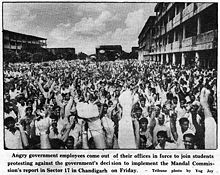- Mandal Commission protests of 1990
-
- see main article Mandal Commission of India
Mandal Commission protests of 1990 were against giving government jobs to certain castes on basis of birth rather than merit of the candidate. These protests closed roads, highways, transportation services, government services, schools, and businesses of India. Anti-reservationists protested. Student protests were planned publicly, and in advance. Protest events were photographed for many published articles of newspapers locally and nationally.[1] Protests began during the year when the eleven-year-old Mandal Commission was opened to bring into effect new government employment opportunities, reservation for backwards classes.
Between the failure to effectively control the political cost of the protests escalating enough to close parts of the nation, and an eleven-year-old human rights improvement project, were causes that ultimately led to accepting the resignation of the Janata Dal party's Prime Minister of India, V. P. Singh. Most likely, the protests were comparable to a globally largest, unified national demonstrations of a labour union strike combined with a version of a race riot.[citation needed]
These protests were widespread and enjoyed support of common people. "There is reason to believe that the students' protests in 1990 would not have been so ferocious if it were not for the covert support extended to them by certain political parties, such as the Congress and the Bharatiya Janata Party."[2]
Culturally unique features of the protests and riots were bandhs (a version of a strike), hartals (a version of a municipal shut-down), dharnas (a version of swarming). Incidents of destruction of public property, looting, and intimidation for bandhs, hartals and dharnas were published and listed geographically as travel information in newspaper articles. Articles also highlighted politicians and victims of rioting during the protests. Although not advisable, late summer travel by airline and vehicle during the protests was possible without delays, between capitals New Delhi and Chandigarh, and Shimla for example. Police prevented extending the range and duration of the strikes, and some strike activity from even occurring. A national state of emergency was largely not declared to mobilize army units against any one demonstration.[citation needed]
Contents
Rajiv Goswami
Rajiv Goswami was the first student to attempt self-immolation while a student at Delhi University in 1990 to protest against Prime Minister V.P. Singh's implementation of the Mandal Commission laws for Affirmative Action (reservation) recommendations. His action sparked a series of self-immolations by college students and led to a formidable movement against job reservations for backward castes, as recommended by the Mandal Commission.
Surinder Singh Chauhan
Surinder Singh Chauhan was the first student to perform self-immolation while an evening student of Deshbandhu College (Delhi University) on September 24, 1990 to protest against implementation of the Mandal Commission recommendation for reservation to candidates based on birth. He left a suicide note stating that "The responsibility for my death lies with those people who consider reservation a vote bank, people like V.P. Paswan, Yadav ...".
References
- ^ The Tribune newspaper, 1 September 1990, Chandigarh, India.
- ^ cover story, Venkatesan, V.. "Political Consensus", "Frontline" magazine, Vol 23, Issue 08, 22 April–May 4, 2006, India. Retrieved 13 Mar 2007.
See also
Reservation in India Indian caste system · Scheduled castes and tribes · Other Backward Classes · Forward classes · Kalelkar Commission · Mandal Commission · 2006 anti-reservation protests · Youth for Equality · IIT reservation policy · Poona Pact
Categories:- Conflicts in 1990
- 1990 in India
- Reservation in India
- Protests in India
Wikimedia Foundation. 2010.



